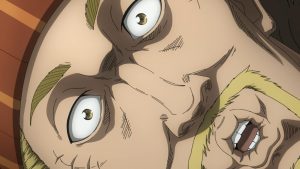 The word “cinematic” gets tossed around a lot as praise for a TV show (I’ve done it myself here and there) but I think it really applies to Vinland Saga. Following this series really is like watching a short movie every week – or at least, watching an HBO drama (which usually may as well be a theatrical movie, based on budget). It’s also a universal in a way most anime epics, such as Golden Kamuy, are not. When we see material like this presented though an anime perspective but mostly lacking in tropes and culturally specific aesthetic, the result can often be stunningly good.
The word “cinematic” gets tossed around a lot as praise for a TV show (I’ve done it myself here and there) but I think it really applies to Vinland Saga. Following this series really is like watching a short movie every week – or at least, watching an HBO drama (which usually may as well be a theatrical movie, based on budget). It’s also a universal in a way most anime epics, such as Golden Kamuy, are not. When we see material like this presented though an anime perspective but mostly lacking in tropes and culturally specific aesthetic, the result can often be stunningly good.
 It’s also interesting to compare Vinland Saga against 2019’s other great anime epic, Dororo. That show was structurally quite Western, but it presented a quintessentially Japanese experience – survival in one of Japan’s most notorious eras, with a full grounding in Japanese and Buddhist mythology. What Yukimura Makoto seems to be trying to do is to divorce his work from Japanese prejudices as much as possible – the dedication he shows in researching his subject is legendary. And while ultimately such a thing can never fully succeed because we are who we are and our upbringing shapes our artistic sensibility, he’s managed to create something remarkably universal and thought-provoking.
It’s also interesting to compare Vinland Saga against 2019’s other great anime epic, Dororo. That show was structurally quite Western, but it presented a quintessentially Japanese experience – survival in one of Japan’s most notorious eras, with a full grounding in Japanese and Buddhist mythology. What Yukimura Makoto seems to be trying to do is to divorce his work from Japanese prejudices as much as possible – the dedication he shows in researching his subject is legendary. And while ultimately such a thing can never fully succeed because we are who we are and our upbringing shapes our artistic sensibility, he’s managed to create something remarkably universal and thought-provoking.
 The elephant in the room for this series is certainly Prince Canute – and his devout Christianity. That’s been the case for a few weeks but never more so than here, where he’s a presence in almost every scene. That’s an interesting effect because Canute still hasn’t uttered a word – if it weren’t for the fact that he has a seiyuu (and a well-known one) I’d have started to suspect Yukimura-sensei decided to make him a mute. Again, if you know your history you know the role Canute is fated to play in these events more or less, but the path VS is taking with him is certainly an interesting one.
The elephant in the room for this series is certainly Prince Canute – and his devout Christianity. That’s been the case for a few weeks but never more so than here, where he’s a presence in almost every scene. That’s an interesting effect because Canute still hasn’t uttered a word – if it weren’t for the fact that he has a seiyuu (and a well-known one) I’d have started to suspect Yukimura-sensei decided to make him a mute. Again, if you know your history you know the role Canute is fated to play in these events more or less, but the path VS is taking with him is certainly an interesting one.
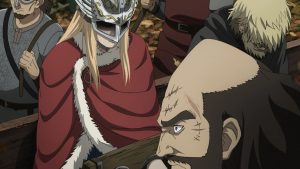 As it stands, we have a three-cornered drama playing out in the forests of northern England. Canute and his retinue – Ragnar and the drunken priest whose name I don’t know – are prisoners of Thorkell and his men. They’re making no effort to conceal themselves as they saunter north and why should they, when the whole reason Thorkell kidnapped the prince was to provoke an attack? Thorkell jovially muses on the relative merits of Norse religion vs. Christianity (the tone masks what’s actually a rather serious part of Vinland Saga’s narrative) and good-naturedly mocks the silent prince and his Christian companions as they wait for the attack they know is coming.
As it stands, we have a three-cornered drama playing out in the forests of northern England. Canute and his retinue – Ragnar and the drunken priest whose name I don’t know – are prisoners of Thorkell and his men. They’re making no effort to conceal themselves as they saunter north and why should they, when the whole reason Thorkell kidnapped the prince was to provoke an attack? Thorkell jovially muses on the relative merits of Norse religion vs. Christianity (the tone masks what’s actually a rather serious part of Vinland Saga’s narrative) and good-naturedly mocks the silent prince and his Christian companions as they wait for the attack they know is coming.
 Thorkell is an interesting contrast to Askeladd, seemingly as simple as the latter is complex. Thorkell is not stupid by any means – his sense of both tactics and strategy is clearly elite – but his desires seem very straightforward. Fatty autumn fish and meat, battles worth fighting, and ultimately an escort from the Valkyries into Valhalla for an eternity of the first two. He doesn’t love to fight because he’s cruel or sadistic – he just gets off on the rush. When a party of the main army (claiming to be 2000 – a ruse seen through immediately by Thorkell – but probably about 400) arrives to “surround” him, Thorkell lets Canute and his entourage go without a worry. They’ve performed their function, so what does it matter?
Thorkell is an interesting contrast to Askeladd, seemingly as simple as the latter is complex. Thorkell is not stupid by any means – his sense of both tactics and strategy is clearly elite – but his desires seem very straightforward. Fatty autumn fish and meat, battles worth fighting, and ultimately an escort from the Valkyries into Valhalla for an eternity of the first two. He doesn’t love to fight because he’s cruel or sadistic – he just gets off on the rush. When a party of the main army (claiming to be 2000 – a ruse seen through immediately by Thorkell – but probably about 400) arrives to “surround” him, Thorkell lets Canute and his entourage go without a worry. They’ve performed their function, so what does it matter?
 The wild card here is Askeladd – and being the wild card seems to be Askeladd’s existential role in life. He’s been shadowing Thorkell’s pursuers and when the moment comes, he sets the forest alight with plans to have Thorfinn snatch the prince in the confusion. It’s a classic Askeladd plan – minimizing risk to he and his men, utlilizing Thorfinn’s skill and fearlessness, and offering an escape hatch if it fails. The approaches of he and Thorkell to this confrontation could hardly be more emblematic of just how polar opposite these two men are, and Canute more than anything seems just a pawn in a larger struggle.
The wild card here is Askeladd – and being the wild card seems to be Askeladd’s existential role in life. He’s been shadowing Thorkell’s pursuers and when the moment comes, he sets the forest alight with plans to have Thorfinn snatch the prince in the confusion. It’s a classic Askeladd plan – minimizing risk to he and his men, utlilizing Thorfinn’s skill and fearlessness, and offering an escape hatch if it fails. The approaches of he and Thorkell to this confrontation could hardly be more emblematic of just how polar opposite these two men are, and Canute more than anything seems just a pawn in a larger struggle.
 Ragnar does make note of that last point – “Why is it never the Prince’s decision?”. But while we see Canute’s face at last thanks to Askleadd’s request/demand, there are still no words – just an extremely feminine visage and a defeated expression. The moment that stays with me, though, is the reunion of Thorfinn and Thorkell, where the latter finally gets the chance to tell the boy that he knew his father. We’ve not seen the last of this – Thorkell acknowledges Thors as “the one man stronger than me”, and clearly has no idea he’s dead, and now Thorfinn knows a man his father may have called friend walks the same paths as he. Loyalties are going to be tested on many fronts, that much is certain, and as far as what was going on in England at this time that’s 100% historically accurate.
Ragnar does make note of that last point – “Why is it never the Prince’s decision?”. But while we see Canute’s face at last thanks to Askleadd’s request/demand, there are still no words – just an extremely feminine visage and a defeated expression. The moment that stays with me, though, is the reunion of Thorfinn and Thorkell, where the latter finally gets the chance to tell the boy that he knew his father. We’ve not seen the last of this – Thorkell acknowledges Thors as “the one man stronger than me”, and clearly has no idea he’s dead, and now Thorfinn knows a man his father may have called friend walks the same paths as he. Loyalties are going to be tested on many fronts, that much is certain, and as far as what was going on in England at this time that’s 100% historically accurate.


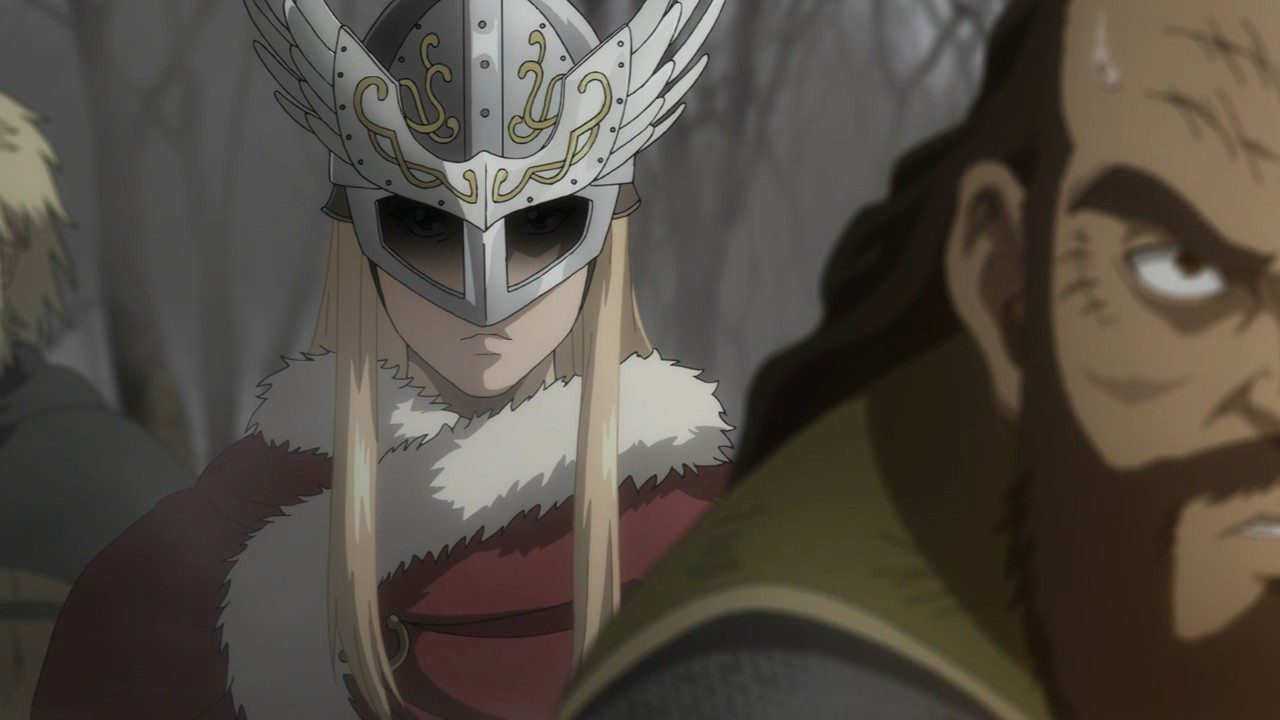


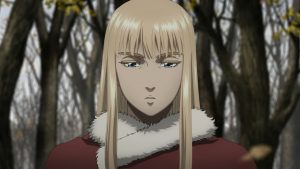

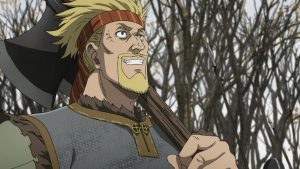
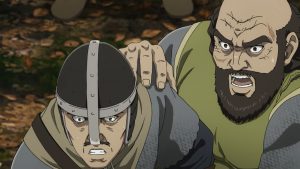

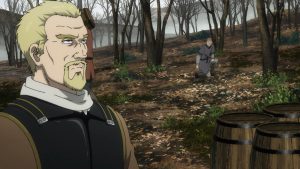
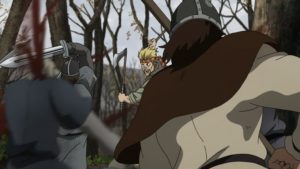
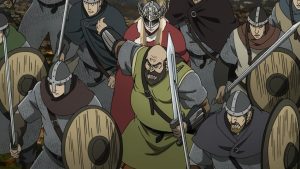
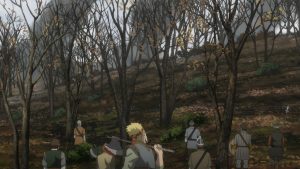



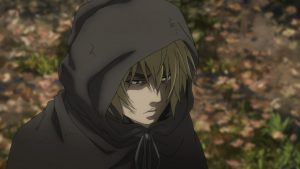
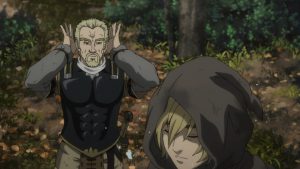

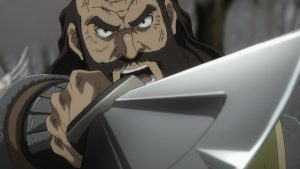
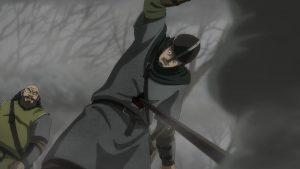


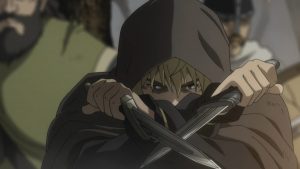


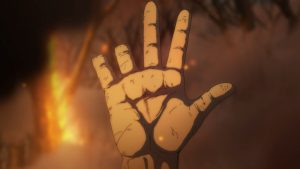

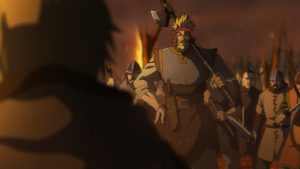
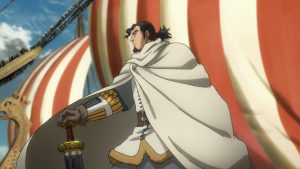

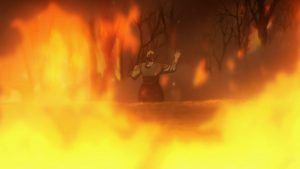
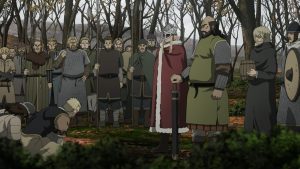
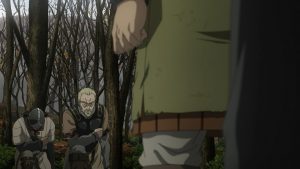
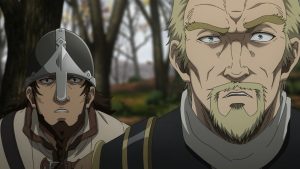


Ronbb
September 23, 2019 at 1:53 pmI’m sure that there will be more encounters between Thorkell and Thorfinn to come, but hope there will be some quite moments between the two, sharing stories of Thors.
Guardian Enzo
September 23, 2019 at 2:19 pmOh, that was part of what I was predicting to be sure. I’ll be both stunned and disappointed if it doesn’t happen.
Ronbb
September 24, 2019 at 2:09 pmLooking forward to those moments!
P.S. Love that Thors lives on…
Jindujun93
September 23, 2019 at 2:26 pmTo make Thorkell even more dangerous, the guy is bound to have tons of experience – I mean, the first episode showed him in 987, and now we’re in 1013 – the guy has over a quarter of a century of battle experience, possibly even more, and given the time this is set at, this alone is already a tremendous feat.
Actually makes me wonder how old Thors would have been at this point if he actually lived through the events at the beginning.
Guardian Enzo
September 23, 2019 at 2:37 pmI would place both Thors (if he’d lived) and Thorkell in their early to mid-40s. Askeladd too, though it’s based strictly on appearances rather than corroborating evidence with him.
Jindujun93
September 23, 2019 at 11:17 pmOh, as a side note – the subtitles probably made it more ambiguous, but Thorkell *should* be fully aware that Thors is dead. Leif delivered Thors’ head to Sigvaldi (Thorkell’s brother according to Floki two episodes ago) after his death to avert the village getting razed by the Jomsvikings after all, and considering how Thorkell fought alongside Thors, I’d find it very surprising if he didn’t hear of it in the 10~11 years that passed since then.
Derrick
September 23, 2019 at 3:04 pmreligion, nobility, war etc are always recipe for intriguing story
Lark
September 23, 2019 at 10:01 pmOh man, I suppose I was wrong when I said Canute would be talking in this episode. Sorry, Enzo- memory fails me sometimes.
I’ve never quite felt comfortable when religion is explicitly discussed in anime. Was conflicted about in Junketsu no Maria and am conflicted about it here (and no, I’m not Christian/Catholic). Makes sense here, obviously- given that the Vikings know very little about Christianity- but I still squirmed. Ah, well- in both cases I convinced myself that the long-term journey would be worth it.
Marty
September 24, 2019 at 5:45 amWhen you mean religion do you mean any religion, like the Buddhist attitude tackled in Dororo or specifically western religions?